 Petzlover
Petzlover Bantam Bulldog is originated from United Kingdom but Greater Swiss Mountain Dog is originated from Switzerland. Bantam Bulldog may grow 36 cm / 14 inches shorter than Greater Swiss Mountain Dog. Bantam Bulldog may weigh 50 kg / 110 pounds lesser than Greater Swiss Mountain Dog. Both Bantam Bulldog and Greater Swiss Mountain Dog has almost same life span. Bantam Bulldog may have less litter size than Greater Swiss Mountain Dog. Bantam Bulldog requires Low Maintenance. But Greater Swiss Mountain Dog requires Moderate Maintenance
Bantam Bulldog is originated from United Kingdom but Greater Swiss Mountain Dog is originated from Switzerland. Bantam Bulldog may grow 36 cm / 14 inches shorter than Greater Swiss Mountain Dog. Bantam Bulldog may weigh 50 kg / 110 pounds lesser than Greater Swiss Mountain Dog. Both Bantam Bulldog and Greater Swiss Mountain Dog has almost same life span. Bantam Bulldog may have less litter size than Greater Swiss Mountain Dog. Bantam Bulldog requires Low Maintenance. But Greater Swiss Mountain Dog requires Moderate Maintenance
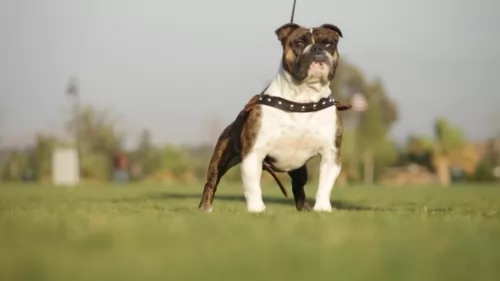 The origin of the Bantam Bulldog goes back to the 1800s, and in fact there is evidence of miniature bull dogs in 1899, In 1902 the smaller bulldog breed was facing extinction, so that it became necessary to import French bulldogs to England to help restore the bantam bulldog breed.
The origin of the Bantam Bulldog goes back to the 1800s, and in fact there is evidence of miniature bull dogs in 1899, In 1902 the smaller bulldog breed was facing extinction, so that it became necessary to import French bulldogs to England to help restore the bantam bulldog breed.
It was only in 2002 that the United Canine Association recognized the English bantam bulldog.
They’re the same as the ordinary bulldog except they are lighter and shorter, although there are slightly larger ones which are as tall as a regular bulldog.
The Bantam bulldogge is related to the English and French bulldogs so that the standards for the bantam breed has similarities to both types.
 Hailing from Switzerland, and one of its oldest dog breeds, the Greater Swiss Mountain Dog has a dubious history in that there are a number of theories as to its origin. He is closely related to the Bernese Mountain Dog, Saint Bernard and Rottweiler.
Hailing from Switzerland, and one of its oldest dog breeds, the Greater Swiss Mountain Dog has a dubious history in that there are a number of theories as to its origin. He is closely related to the Bernese Mountain Dog, Saint Bernard and Rottweiler.
Of all the theories, the one that says he is descended from large, mastiff-like dogs is a popular one. He used to be a herding- and guard dog, but also was used to pull carts of farm produce.
It was in the 1900s that the dog’s numbers started dwindling. In 1908, canine researcher, Albert Heim recognized the dogs as being large members of the Sennenhund type, a family of four breeds that includes the Greater Swiss Mountain Dog.
He wanted to see the dogs recognized as a separate breed and the Swiss Kennel Club listed the Greater Swiss Mountain Dog in 1909.
In 1968 they were brought to the United States and a club for them was formed. The dog was recognized by the American Kennel Club in 1995 with the dog being recognized as a member of the Working group.
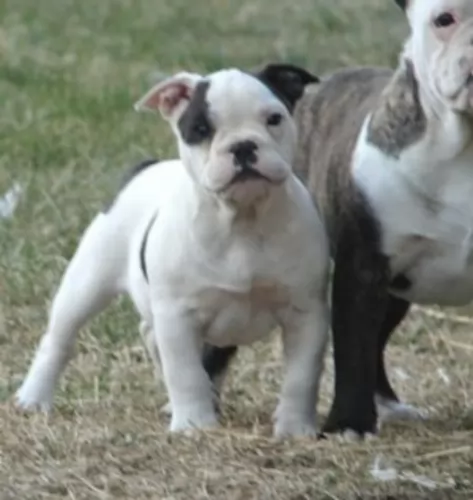 The breed has its origins with the English bulldog, but it was in 2011 that the ‘English’ was abandoned and the name of the dog changed to Bantam Bulldogge. Short to medium in height, and with his large, square head and broad, short muzzle, the dog is short, strong, stout and compact. He had wide apart eyes, short, half-pricked, half-floppy ears and the front legs are also strong and set wide apart.
The breed has its origins with the English bulldog, but it was in 2011 that the ‘English’ was abandoned and the name of the dog changed to Bantam Bulldogge. Short to medium in height, and with his large, square head and broad, short muzzle, the dog is short, strong, stout and compact. He had wide apart eyes, short, half-pricked, half-floppy ears and the front legs are also strong and set wide apart.
He is fit and active with a playful, jovial personality. The Bantam Bulldog is completely at ease with his human family and welcomes visitors to the home. He forms strong bonds with everyone in the family and loves the presence of children in the home too. As with most other dog breeds, he does well with training and socialization – it just makes him a better dog all round. He doesn’t have a problem with accepting other pets in the home.
The coat of the Bantam is short, dense and straight with the skin being tight to the body but looser around the head and neck. Both head and face have moderate wrinkles. The coat is available in all colors and is low maintenance. A good brush twice a week won’t only remove loose hairs and keep his short coat glossy, the mere act of brushing him strengthens the bond between you as well.
 Swissies, as they are often referred to as, are large, robust dogs, standing at 65–72cm and weighing anything between 50 – 70kg, with the females being slightly smaller and weighing a little less.
Swissies, as they are often referred to as, are large, robust dogs, standing at 65–72cm and weighing anything between 50 – 70kg, with the females being slightly smaller and weighing a little less.
He has big, rounded paws, medium length floppy ears, a broad chest and a long tail. This is a heavy-boned dog, strong while still being agile.
His dense, double coat is black, white and tan or rust, with black on top of the dog's back, ears, tail and legs. There are two rust dots above each eye. The coat can be short and straight to medium length, coarse and wavy. The dog sheds throughout the year with a major shedding a couple of times a year.
The Greater Swiss Mountain Dog is a sociable canine, thriving on being part of a loving human family. While he used to be a working farm dog, today he is essentially a family pet, though he loves to still be busy.
He is generally friendly with strangers, but just like with all other dog breeds, he will need to be trained and socialized to turn him into an even-tempered, obedient dog, capable of getting on well with children and pets in the the home.
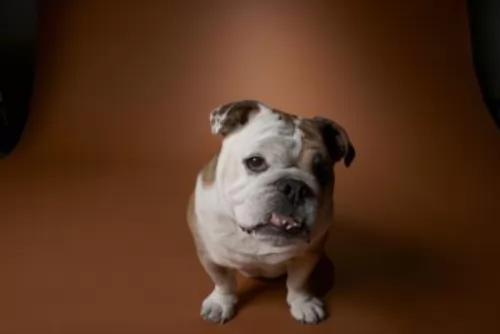 The Bantam Bulldog is full of personality and is active, friendly and social. He is an adaptable pet and will happily live with his human family in an apartment or in a home with a garden. Patient and tolerant, he responds well to the voice of his owner and simple commands are no problem with him as he is quick to learn and to please.
The Bantam Bulldog is full of personality and is active, friendly and social. He is an adaptable pet and will happily live with his human family in an apartment or in a home with a garden. Patient and tolerant, he responds well to the voice of his owner and simple commands are no problem with him as he is quick to learn and to please.
He is never going to be much of a guard dog for you, but he will be a happy, contented, loyal and devoted companion who just wants to be as close to you as he can.
 The Swissy is an easy going dog and adapts easily into his human family’s lifestyle. He is big, but agile dog known for his gentle temperament.
The Swissy is an easy going dog and adapts easily into his human family’s lifestyle. He is big, but agile dog known for his gentle temperament.
While he loves the outdoors, he is a social dog and loves nothing more than coming indoors and being close to his human family.
He loves his family and won’t do well if left outside for days without human companionship. Treat him well and you’ll be rewarded with a loyal, loving 4-legged family member.
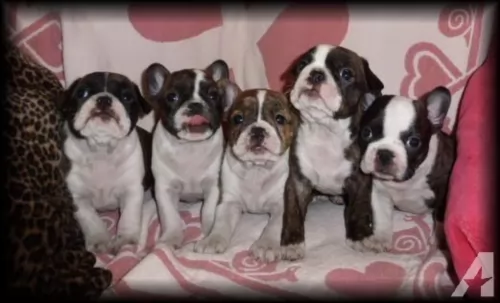 A happy dog is a healthy dog, but the happy Bantam Bulldog will be prone to certain ailments that are common to his breed
A happy dog is a healthy dog, but the happy Bantam Bulldog will be prone to certain ailments that are common to his breed
This breed of dog is prone to have hip dysplasia. Because of their genetic make-up, the soft tissues surrounding the joint develop abnormally and the disease can affect one- or both hips.
Bulldogs can also be prone to digestion issues which amounts to flatulence. This problem however, can be reduced significantly by giving your pet the best diet. Speak to your vet about appropriate foods for dogs with a sensitive stomach. With a sensitive stomach, you want to avoid dog foods with toxic colorants, artificial preservatives and artificial flavors.
Be aware of breathing problems with your bantam bulldog because flat-faced dog breeds such as this can battle with upper airway problems. Symptoms of an obstructed upper airway can include noisy breathing, panting, snoring, rapid breathing and coughing.
 The GSMD or Sennenhund, as his name is shortened to, is a fairly healthy dog breed, with very few health issues.
The GSMD or Sennenhund, as his name is shortened to, is a fairly healthy dog breed, with very few health issues.
He has an average lifespan of 10 to 12 years, and although not likely, he can suffer from minor problems such as gastric torsion as well as female urinary incontinence. If your female dog is dribbling urine in her sleep, there are a number of reasons that can be causing it - bladder infections, a medical condition or a weakened bladder with spayed female dogs.
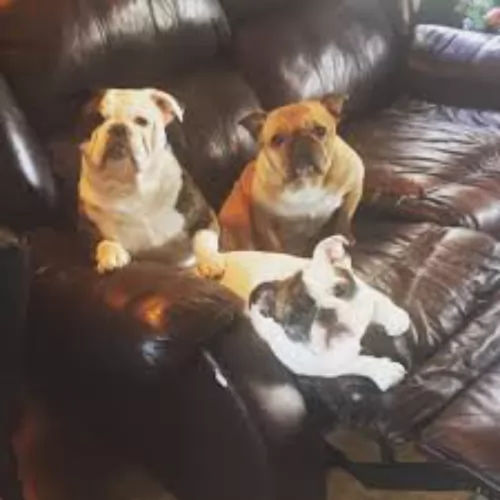 Your Bantam Bulldog needs a lot of protein in his diet. In fact, the Association of American Feed Control Officials have suggested that the dog needs at least 22% of maintenance protein for puppies and 18% of protein for adult dogs. Speak to your vet about wet- and dry dog foods and which foods will suit this particular pet of yours. Always ensure cool, fresh water is within your pet’s reach.
Your Bantam Bulldog needs a lot of protein in his diet. In fact, the Association of American Feed Control Officials have suggested that the dog needs at least 22% of maintenance protein for puppies and 18% of protein for adult dogs. Speak to your vet about wet- and dry dog foods and which foods will suit this particular pet of yours. Always ensure cool, fresh water is within your pet’s reach.
The exercise needs of the Bantam Bulldog are minimal. He is never going to turn down a game of ball with the kids but you don’t have to take him on long walks or runs. He is a social pet, so even though you don’t have to be putting him through an exercise program every day, he doesn’t want to be left alone hour after hour, day after day.
 The Greater Swiss Mountain Dog is a robust dog and thrives on a diet of kibble to raw meat to some cooked home-made food such as chicken, brown rice and vegetables.
The Greater Swiss Mountain Dog is a robust dog and thrives on a diet of kibble to raw meat to some cooked home-made food such as chicken, brown rice and vegetables.
A serious issue with the GSMD is overfeeding, resulting in uncomfortable digestive problems and of course, obesity.
Your GSMD isn’t a dog that is going to require a lot of exercise like some of the other dog breeds there are, but still his working career of the past requires that he still be taken on daily walks, enjoys ball- and rope games and to go swimming.
Brush your dogs coat at least twice a week to remove loose hears. Other grooming aspects include cleaning the ears to avoid infection, clipping his nails and brushing his teeth at least twice a week.
If you’re not sure how to do all these things, there are useful accessories for dogs that allow you to do all this grooming on your own. Your vet can also show you how as these are all things that will require ongoing attention.